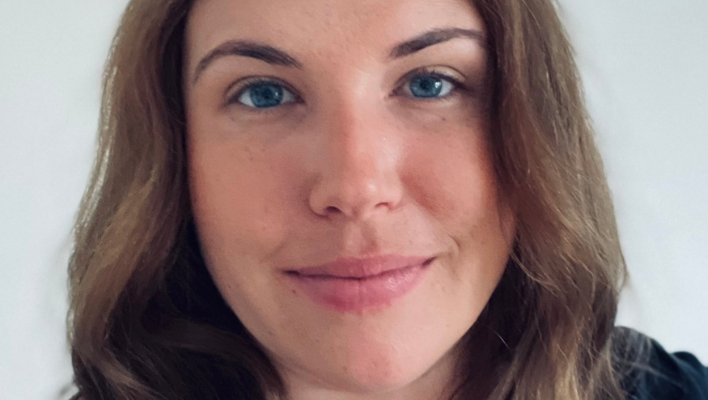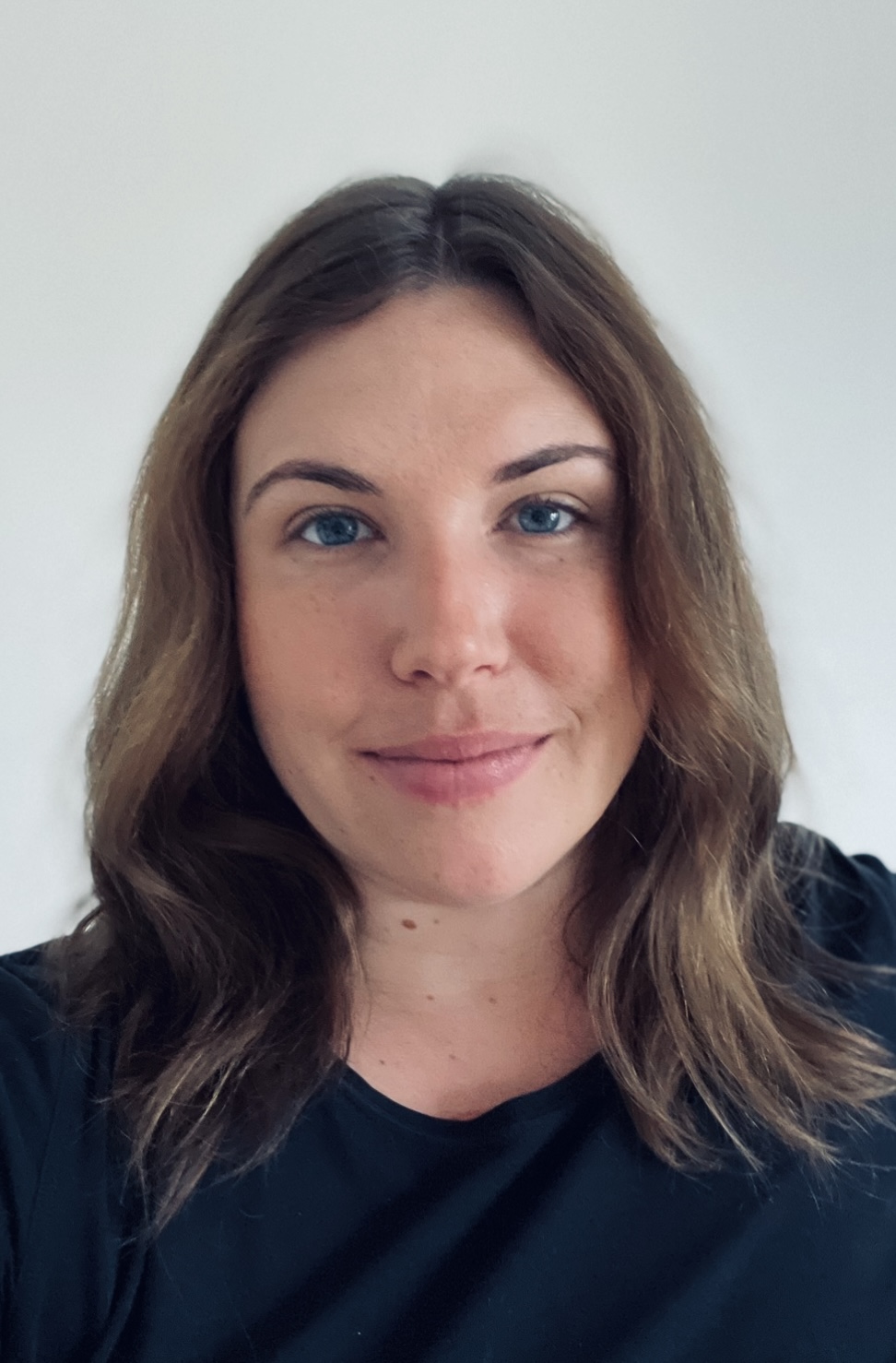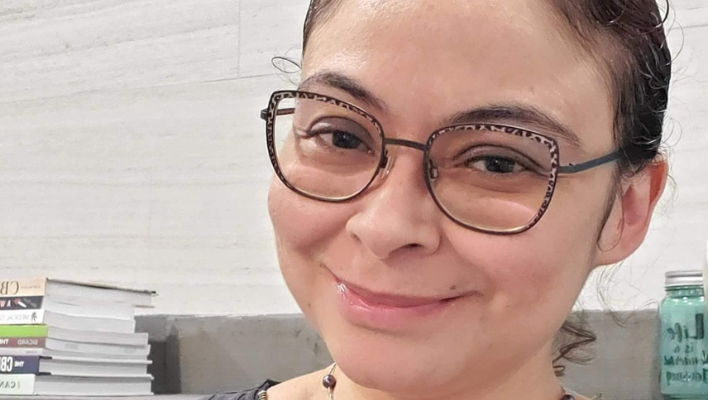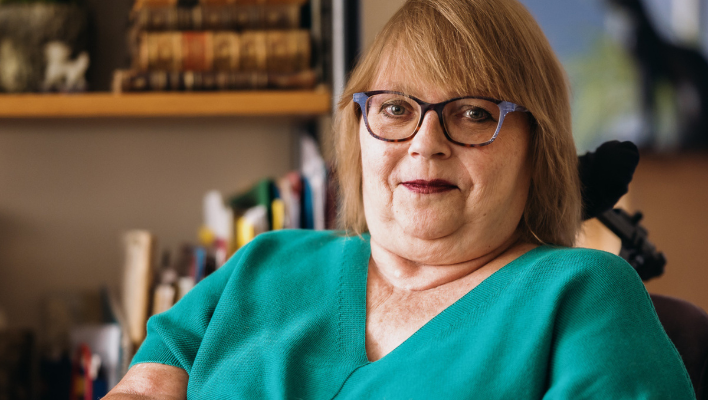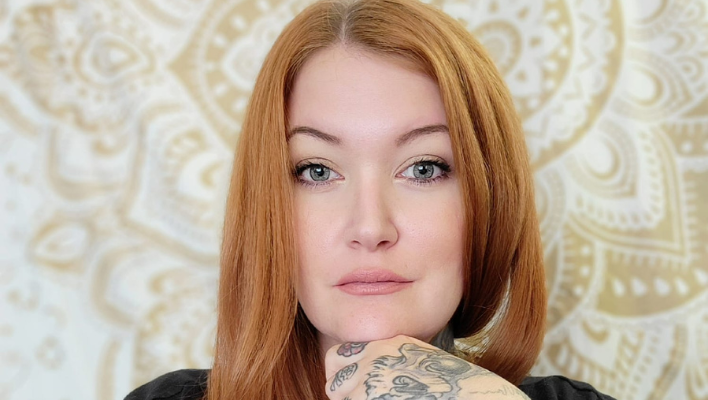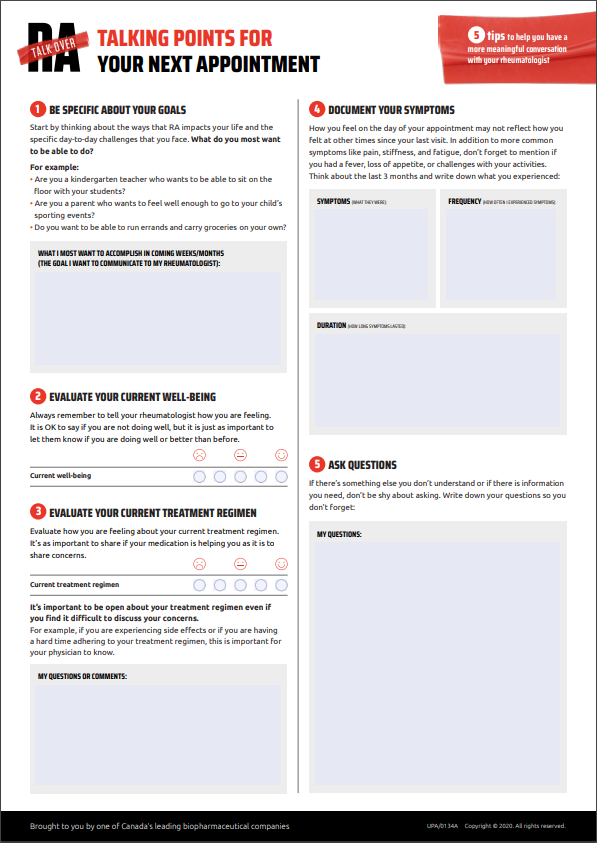PEOPLE LIKE YOU ARE SPEAKING UP FOR THEIR HEALTH
Rheumatoid Arthritis: Don't Tough It Out, Rein It In
JULIA
What is your rheumatoid arthritis (RA) story / journey? Can you briefly describe how you felt when you first experienced symptoms, what you thought when you were first diagnosed, and where you are today?
I was diagnosed with juvenile idiopathic arthritis at the age of two and continue to live with rheumatoid arthritis today. I was a baby when my symptoms began, so it’s difficult to remember how I felt when I first experienced them. My parents tell me that as a child I limped occasionally and that I expressed pain when my joints were swollen, mainly in my knees and my neck.
Now I'm in my 30s and my RA has changed. I have severe RA both in my spine and in my knees. I also have RA in my hands, wrists, feet, and maybe a little bit of hip RA. RA doesn't only affect the joints, it causes varying degrees of fatigue, so some days I am able to walk and other days it might be nearly impossible. This has affected my mental and emotional health, my career path, and my day-to-day life.
RA has thrown me a lot of curveballs - but I am very proud of myself for never giving up and for continuing to adapt through the different stages of life with rheumatoid arthritis.
How has living with RA changed your life?
Living with RA has made me focus on and cherish my health and wellness. Living with arthritis has motivated me to become an advocate for myself and for others. It has also led me to pursue a career improving people's well-being and helping others with arthritis. My RA has pushed me to create The RA Yogi YouTube channel, which offers free Yoga For Arthritis videos and support online. My RA has also driven me to continue to work on projects and programs for arthritis awareness and education, and to continue my studies in Yoga Therapy.
Why is it important to advocate for yourself with your health care team? Can you share an example of a time you needed to do this?
It’s vital to advocate for yourself because you’re the one living with the condition. The insight that you have can help your health care team to better understand where you’re at and where you'd like to be, helping you both work together more effectively.
I’ve had to advocate for myself in many ways, but one example that comes to mind is how I’ve had to advocate about my treatment plan and what works for MY body. Being my own advocate has even led me to find a new rheumatologist to work with on one occasion.
Another way I’ve advocated for myself includes requesting certain medical tests so I can get more answers about my illness. I’m also always seeking out more resources, such as looking into what additional government resources are out there for me. This is what led me to participate in a rheumatoid arthritis program at a local rehabilitation centre. That was incredible and very impactful in my RA management and education.
Advocating can be challenging, but it’s also very empowering!
What advice / words of wisdom would you give to friends, family and caregivers of people living with RA?
Be kind to yourself.
Breathe.
Do research about your condition or your loved one’s condition to better understand it.
Discover the different ways of managing and caring for your RA that work best for YOU. Make a plan of action. Journal. Keep track of how you’re doing, of how you feel, and share this with your health professionals.
Take a holistic approach to managing your RA! Think about how you can increase your overall physical, mental, emotional, social, spiritual, environmental, and occupational wellness. If you can’t work due to a disability, that’s okay! There are many other ways to contribute to others and to the community.
If you could share a message of hope with other people newly diagnosed with RA, what would you say?
You are stronger than you know. Being diagnosed with a chronic illness isn't easy, but there is a lot you CAN do to help yourself. You are not alone! There is access to more information about how to TALKOVERRA right here on this site! I would encourage you to use these resources and to get involved with a supportive community like The Arthritis Society.
I am still living a full life with my RA. I may have to manage my illness for the long-term and modify or omit certain activities I used to do, but it has opened the door to new experiences and to a more expansive way of looking at my life and how I want to live it: WELL!
MICHAEL
What is your rheumatoid arthritis (RA) story / journey? Can you briefly describe how you felt when you first experienced symptoms, what you thought when you were first diagnosed, and where you are today?
My RA story is an ongoing process that I deal with every day. Each day is different for my arthritis and I handle it accordingly.
I really had no idea what RA was when my doctor first mentioned it to me. I didn't know what this disease entailed, however, I knew it was going to be a huge learning curve for me.
I thought I had a kidney stone at first, when I got my first "flare up" of this disease, however I quickly was diagnosed with arthritis. After seeking a second and even a third opinion, I was able to find out that I had rheumatoid arthritis. I even sought help after the diagnosis from a specialty clinic to learn how I could best live with this disease.
It was very frustrating at first because finding the right medications for me meant first failing several medications. I even had a bad allergic reaction to one. Now, by working with my doctors, we’ve found a stable dose of medications that have let me live my life on my terms. I am able to manage my day-to-day life with sleep, a lot of water, trying to eat healthy and also listening to my body. I do not push my body like I used to when I was younger, I listen to it and make those daily decisions based on how I feel.
How has living with RA changed your life?
Living with rheumatoid arthritis has changed my life immensely. I was diagnosed in my 20s, so it changed everything about my life and lifestyle. I quickly had to schedule everything in order to fit it all in without being too fatigued. I had to seek assistance with my business and also delegate a lot more tasks within my fashion brand.
Having arthritis has opened my eyes to the fact that the disabled are treated very differently. I have been a patient advocate for many years now for arthritis and I will continue to advocate so that people like me can live an easier life.
Why is it important to advocate for yourself with your health care team? Can you share an example of a time you needed to do this?
It is VERY important to advocate for yourself with your doctors and health care team because you are your best voice. You can communicate exactly what you are feeling and you should be very open and have a good relationship with your health care team so you can feel open to share. I am usually a reserved patient with doctors, however, I do voice my concerns and any discomfort or pain that I am having.
I have had to advocate for myself many times. One example is when I was given a high dose of a medication that turned out not to agree with me. It was horrible. My body did not react well and I needed my doctor to know that this was not the correct medicine for me.
I was able to speak to my medical team and create a plan of getting me to a lower dose of the medication, and eventually to find another medication that works better for my body.
What advice / words of wisdom would you give to friends, family and caregivers of people living with RA?
If you have a patient, friend or family member with RA, the best thing you can do is to listen to them and believe what they say. You cannot always see RA, which makes it hard for many people to understand, especially when it comes to the pain aspect. When someone with RA opens up about being fatigued, tired and or in pain, please listen and offer any help you can. It takes a lot for someone who is in constant pain to ask for help.
If you could share a message of hope with other people newly diagnosed with RA, what would you say?
I do not let RA take the best of me. I really strive to work around the disease instead of the other way around. I have a lot of things that I want to accomplish in my lifetime and I will not have this disease keep me back from doing all of them. I feel that it may take me a longer time to get to the finishing point, however, as long as I am still pushing forward each day, getting out of bed and moving towards to the finish line, I know that this disease is not winning or taking over my life.
CRISTINA
What is your rheumatoid arthritis (RA) story / journey? Can you briefly describe how you felt when you first experienced symptoms, what you thought when you were first diagnosed, and where you are today?
I grew up in Medellin, Colombia, I engaged in healthy lifestyle behaviour such as exercising regularly and eating wholesome, fresh food. Despite my lifestyle, at 22 years old, I was diagnosed with rheumatoid arthritis (RA). With no high-speed internet or support groups, I had to figure out what was happening to my body on my own. I felt lonely and embarrassed to be limping like an old lady; no one else my age had to suffer such intense pain.
I had a quick onset of RA and was diagnosed within two months by a very helpful family doctor in Colombia. My fingers looked like sausages and it hurt to lift a sheet of paper. I was terrified of not being able to graduate as a Nutritionist and Dietitian with my peers. Thanks to some aggressive treatment, I managed to reach the finish line.
How has living with RA changed your life?
I lost my spark and motivation when I got diagnosed with RA. Moving to Canada in 2007 has been one of the best decisions I’ve made in my life, though it came with a price. I thought the best way to adapt to a new country was to hide my pain, suck it up and move on. I followed my doctor's prescription for my RA and forgot about everything else. I pushed through my first Canadian winter, worked hard to validate my degree as a registered dietitian and focused my efforts on helping seniors in long-term care homes. I wanted to feel normal without thinking about my disease. But who was I kidding? Autoimmune diseases are control freaks, and mine controlled where I worked, who I was friends with and what events I could attend. It even decided when I could have a baby – not in my 20s as I'd hoped, but in my mid-30s.
What advice / words of wisdom would you give to friends, family and caregivers of people living with RA?
Don't let rheumatoid arthritis overshadow your inner beauty and life projects. Sure, you will need to make changes and adapt. This disease also teaches us to be more resilient and stronger individuals. The old saying, it takes a village to raise a child, also applies to people living with RA. Build your village, surround yourself with supportive friends and family who will be there for you no matter the pain and unexpected complications.
After surviving postpartum pain and, most recently, a COVID-19 infection, I am reminded that living with rheumatoid arthritis is a marathon, not a sprint. We must focus on what we CAN control. Self-advocacy is our most powerful tool if we want to thrive with RA.
If you could share a message of hope with other people newly diagnosed with RA, what would you say?
I truly believe in the saying that when you smile, the whole world smiles with you. Sure, there are hardships, sad moments, times when you feel like giving up. But look at all the meaningful connections you've made in spite of RA – and even because of it. I wouldn't have some of the most amazing friends if it wasn't for my rheumatic condition. They give me a sense of solidarity. I find comfort in chatting with them, talking about my symptoms and having the whole room nod in approval. "Yes, me too.”
LENE
Why is it important to continue to seek care during the pandemic?
Rheumatoid arthritis doesn’t take a break, so it’s important to keep in touch with your rheumatologist, during the pandemic and any other time. Protect your body and the ability to live your life as much as you can.
What has been your experience with virtual care? Any tips for others?
I’ve had a great experience with virtual care during the pandemic. It has saved me a lot of time and energy that normally goes to transit and wait time. Like with any doctor’s appointment, it helps to be prepared. Think about the main topics you want to cover during the appointment and write down your questions to help keep the conversation on track.
How has living with RA changed your life? What challenges have you overcome? Would you have a message of hope for others?
Over my half a century with RA, I have learned that this condition ebbs and flows. Sometimes it takes over your life, at other times it’s in the background and the goal is for it to remain there. My life includes RA, but it is not defined by it. It helps to remember that I have RA — it doesn’t have me.
EILEEN
What is your rheumatoid arthritis (RA) story / journey? Can you briefly describe how you felt when you first experienced symptoms, what the diagnosis was like and where you are today?
I started to experience pain in my small joints in my hands and feet around 24, I thought it was due to my job as an esthetician or because I needed to lose weight. My symptoms increased after the birth of my son when I was 27 - I couldn't wear my usual shoes anymore, my job became difficult and painful, I was constantly catching colds all the time, my mental health was struggling, I had trouble sleeping and was always tired. I thought it was because I was a new mom, working with a toddler, still needed to lose the baby weight or exercise more, eat healthier but it just kept getting worse. Eventually I requested a rheumatoid arthritis test from my family physician because of the history of the disease in my family. I am grateful I did because without proper treatment, developing self management skills, learning to exercise and my health care team I wouldn't be able to do some of the things I can do today, including everyday living activities to what I enjoy in my free time.
Why is it important to advocate for yourself with your health care team?
Your health care team cannot read your mind and RA is much more than just joint pain or inflammation markers on your labs. It is important to bring up all your symptoms, from mental health to physical, with your health care team regularly to make sure you are managing your illness well, getting enough support and your medications and treatments are right for you. There is no better advocate for your health than yourself.
What advice would you give people newly diagnosed with RA?
Tracking my health gave me such a deeper understanding of living with RA and my overall health. Doing so I was able to plan around my symptoms and treatments, have a better understanding of how my sleep, medications, pain, stress and mood impacted my everyday living. Keeping a symptom and treatment journal can help you take control of your health easier.
How has living with RA changed your life? What challenges have you overcome? Would you have a message of hope for others?
RA changed my life in so many ways, both for the worse and for the better. I value what's really important, those closest to me and take better care of myself. I learned to advocate for myself the way in which I needed to.
To download the Discussion Guide in other languages, please click here.

